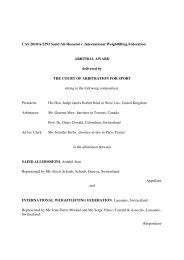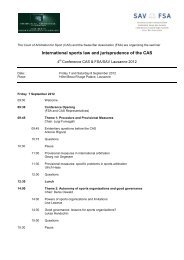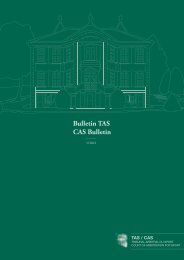CAS 2010/A/2071 - Tribunal Arbitral du Sport / TAS
CAS 2010/A/2071 - Tribunal Arbitral du Sport / TAS
CAS 2010/A/2071 - Tribunal Arbitral du Sport / TAS
You also want an ePaper? Increase the reach of your titles
YUMPU automatically turns print PDFs into web optimized ePapers that Google loves.
a) Article 16<br />
<strong>CAS</strong> <strong>2010</strong>/A/<strong>2071</strong> IFA v/ FAI, Kearns & FIFA - Page 22<br />
part) in an officia1 competition may not thereafter switch to another<br />
association for which he would also be eligible (Article 15 par. 2).<br />
However, if the player satisfies the conditions specified in Article 18, he can<br />
make on a single occasion only a request for change of association.<br />
73. This provision governs the situation where a player, under the terms of Article 15<br />
par. 1, is entitled to represent more than one association “on account of his<br />
nationality”. Under such circumstances, the player must meet one of the four<br />
territorial connections set out in the said provision.<br />
74. Whether the player’s multiple eligibilities are based on one single nationality<br />
and/or on two or more nationalities is disputed. The IFA submits that Article 16<br />
is applicable to any player who is entitled to play for several associations on the<br />
basis of multiple nationalities whereas the FAI submits that it is only applicable to<br />
a player who is entitled to play for several associations on the basis of a “shared<br />
nationality”, i.e. a single e nationality that entitles him to represent two or more<br />
associations.<br />
75. Based on the historical interpretation, it appears that the current Article 16<br />
implements Annexe 2 of the Regulations for the Status and Transfer of Players<br />
(edition 2005). Both provisions have a quasi-identical wording. The title of<br />
Annexe 2 (“Eligibility to play for association teams for players whose nationality<br />
entitles them to represent more than one association”) as well as the FIFA<br />
Commentary compel the conclusion that Article 16 covers exclusively the<br />
situations of players with “shared nationality”.<br />
76. The fact that Article 16 applies only to players with “shared nationality” is also<br />
confirmed by its wording as well as by the systematic interpretation:<br />
• The term of nationality is used in the singular form in the title as well as in<br />
the par. 1 of the provision, according to which “A Player who (…) is eligible<br />
to represent more than one Association on account of his nationality”. The<br />
IFA contends that the use of the singular form is acceptable English and<br />
does include indivi<strong>du</strong>als with more than one nationality. The Panel<br />
observes that such would not be the case in French or German. In this<br />
regard, the French version (“sa nationalité autorise à représenter plus d’une<br />
association”) and the German version of the 2009 Regulations (“Ein<br />
Spieler, der gemäss Art. 15 aufgrund seiner Staatsbürgerschaft für mehr als<br />
einen Verband spielberechtigt ist”) also use the term “nationality” in the<br />
singular form.<br />
• Par. 2 of Article 16 expressly states that associations “sharing a common<br />
nationality” may make an agreement “to vary item (d)of para 1 of the<br />
Article”.





